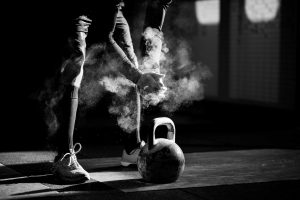- 2nd August 2017
- By Matthew Fever

How often do you change your workout? What are your reasons for changing it? Do you get bored doing the same thing over and over? Perhaps you find it beneficial to always do something new and keep your body guessing? Today’s post will explore the benefits of repetition versus a constantly varied programme.
Let’s begin with ‘Variation’.
If your goal is to improve your general fitness, it is important to first define what this means to you. There are ten components of fitness, depending on what it is you are looking to achieve will ultimately determine what your training sessions look like. You will find that they all complement each other but some will simply be more important to you than others. The ten components are as follows:
Cardio Respiratory Endurance, Stamina, Strength, Flexibility, Power, Speed, Co-ordination, Agility, Balance, Accuracy
Different workouts and activities will include some or all of the above components of fitness. Exposure to a variety of different sports and exercises will ensure that you are challenging your body in a number of different ways, so it is clear to see that variation is certainly of benefit.
Whether you train alone, with a friend, a personal trainer or as part of a group you will at some point experience a loss in motivation. Whatever your current programme of choice, you will have no doubt come to the conclusion that there are only so many ways to move your body, and doing this repeatedly week in, week out, can leave you feeling bored and demotivated. Variation therefore is essential in ensuring adherence over time and boosting morale. I agree it’s boring to do the same thing repeatedly again and again. Variety does the body (and the mind) some good and it will thrive when challenged in different ways. If you are attending different group sessions, or playing on different teams then of course there is also a great social side to all of this too. I have made some of my best friends over the years through training.
If you look at current fitness trends you will find that this type of training is very popular at the moment. Constantly varied group workouts challenge participants each week with new movements and sequences that haven’t been done before.
I have been training for a long time now and I have tried lots of different things over the years. It can be fun to try the latest ‘Hugh Jackman – Wolverine Workout’ from Men’s Health or the ‘Navy Seal Hero Workout of the Day’ but there are a few things to consider along the way.
Firstly, is this relevant to your goals and how does it fit into the bigger picture. Are you training to be a Navy Seal?
The next thing to consider is progression and injury potential.
It makes sense that any programme that you follow should be progressive. This is fundamental in basic programming. Whether your goal is to get stronger, more flexible or improve your cardio-respiratory endurance, gradual improvements each session is the safest and most effective way to develop. Building on your successes session by session will yield the best results. If you constantly change what you do each time you train then by the time you finally get back to what you were originally doing you will ultimately find that you are not much better at it than the last time.
Anytime you do something new that challenges the body you will find there is a potential for injury. I have lost count over the years of the number of fit people who got injured at the charity 5 a side or the office fun run trying to make up numbers for a team.
The injury potential stems from the fact that you are engaging in a workout or activity that you haven’t prepared for. If you are regularly taking part in random workouts then you asking your body to perform in the absence of training. You probably wouldn’t run a marathon without building up your milage so maybe think the next time you decide to try the new workout you found on the internet.
Maybe you put together your own workouts and are forced to adapt what you do each time due to equipment availability during busy periods. This is unfortunate and I can appreciate the frustration but this type of approach will largely be ineffective. Consistency is key.
I have taught group fitness classes for many years, ‘good variation’ always features in the positive feedback from participants. Although I always do my best to make my group sessions progressive, when you have a large group, the variation, more often then not, is to eliminate boredom and ensure adherence rather than being a specific progression on what was performed last week. It’s hard to build on things when you have different people at the class each week and various abilities.
The same thing often happens if you work with a personal trainer. Changing the workouts frequently certainly maintains interest and keeps you coming back for more, but what works best? As a trainer, I am constantly working to balance what the client wants with what I think they need, all the time trying to keep them motivated.
Of course, there is a large percentage of people where progress isn’t necessarily important to them. I have always struggled with this, believing that time invested at the gym should be carefully spent, others have different reasons for participating and I respect that. Some people just like to have fun, exercise a little and feel better. If you fall into this camp, variation is your friend and it probably doesn’t really matter what you do as long as you continue to exercise on a regular basis. You simply need to balance your efforts with what you expect to achieve.

Now, let’s take a look at ‘Repetition’.
If you want to excel at anything you have to be prepared to practice, and practice often. This is true whether you are learning a new skill in the gym or learning a language or musical instrument.
Look at any athlete and you will find that they have spent thousands of hours developing their skills. Rehearsing their movements time again to acquire a high level of skill, efficiency and grace.
I am from a martial arts background. Anyone that has ever made it to black belt will tell you there is a lot of repetition. I believe in mastering the basics, which is why you will see me on a daily basis working with people on simple movements striving for perfection. I believe less is more, making progress on a few exercises or techniques is better than making no progress on many.
The question is, when do you stop what you are doing and do something else?
The answer, when it stops working.
For example if your goal is to get stronger and you follow a programme that sees you continuing to add weight to the bar each session, why would you do anything different? The same is true if you are aiming to improve your 5k time and you just keep getting quicker and quicker.
Of course your goals will probably change over time and this will be reflected in your approach to training. Mine certainly has altered over the last few years.
You might ask, doesn’t your body get used to doing the same thing?
Yes. This isn’t necessarily a bad thing. It’s just important to adjust the right variable if you want to continue moving forward. In training you can manipulate loads, sets, reps, distances, average pace etc without changing the plan completely simply for changes sake.
I believe one of the biggest reasons people quit their plan is that it just gets too difficult. When you first begin training it can be very motivating to see the numbers moving in the right direction but over time the effort required to continue driving progress becomes much too great and for many it stops being an enjoyable experience.
For those that participate in exercise recreationally I believe this is one of the most limiting factors to improvement. The need to always make it fun. Yes, if something is fun you will stick with it for longer and that makes perfect sense. However, the truth is to get really good at something it requires a lot of work, it’s not always fun, it requires you to keep working at it despite the fact that you don’t feel like doing it or perhaps it’s now boring. The reward comes from the accomplishment of spending hours and hours perfecting your craft.
Variation is great, repetition is essential. Ensure your programmes are varied enough to keep them fresh and keep you moving forward but structured enough to avoid injury and ensure progress, if that’s indeed what you are striving for.
